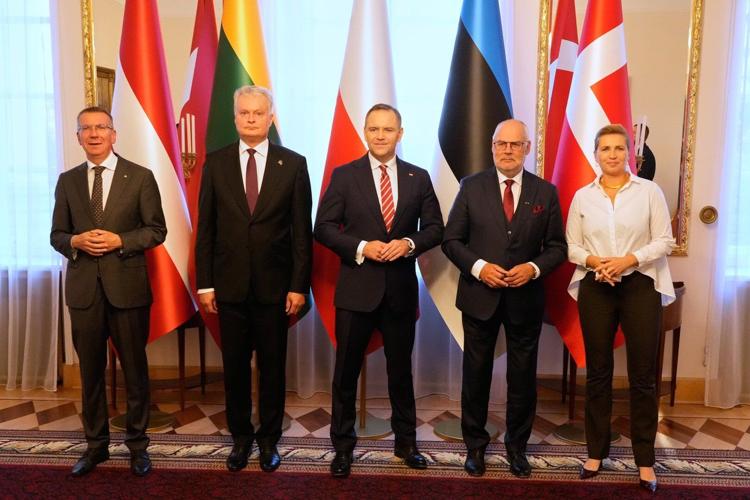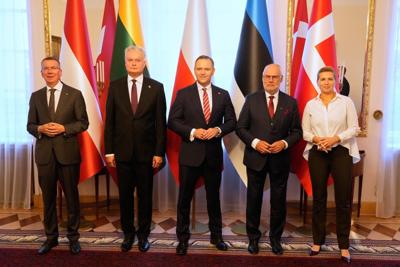WASHINGTON (AP) — Confusion emerged Friday over Trump administration plans to halt some security assistance funding to European countries along the border with Russia, with some Baltic defense leaders saying they have not received official notification.
Pentagon funding for programs that provide training and equipment to reinforce security would be cut, according to a person familiar with the discussions and a congressional aide, who spoke on condition of anonymity because they were not authorized to discuss the matter. It wasn’t clear exactly how much money would be affected, though it could be hundreds of millions of dollars.
It includes funding under Section 333 and the Baltic Security Initiative, which helps finance weapons purchases by — including of U.S. systems — as well as ammunition, special forces training and intelligence support.
A White House official, who was not authorized to speak publicly so spoke on condition of anonymity, said the action has been coordinated with European countries and is part of President Donald Trump’s plan to ensure “Europe takes more responsibility for its own defense.”
The Trump administration has to step up their defense spending and slashed foreign assistance across the board. As Trump remakes the American approach to foreign policy, allies have tried to decipher often murky proposals, from tariffs to troop numbers. It was not clear whether U.S. lawmakers would approve of some of the reductions, which were inconsistent with the Pentagon’s most recent allocations notified to Congress, the congressional aide said.
Baltic countries express confusion and concern
Former Lithuanian Foreign Minister Gabrielius Landsbergis said any cuts to American military support to the Baltic states — part of NATO’s border with Russia — would “only weaken the credibility of NATO’s attempts at deterrence” as drags on.
Vaidotas Urbelis, Lithuania’s Defense Ministry policy director, said there had been “discussions and certain indications” from the U.S. but that the country had received no official information about any reduction in support and was talking to the Pentagon about “which programs will be continued and which may be postponed.”
Latvia’s Defense Ministry also said it had not received any “official notification of concrete decisions” and said it would continue discussions on reaffirming the importance of the support.
The Estonian Defense Ministry said in a statement that it was clear the “current administration’s direction is to significantly cut foreign aid,” but added that U.S. assistance increasingly makes up a smaller proportion of the country’s defense budget because Estonia has ramped up its own spending.
The three Baltic states — as well as Poland — are the NATO countries that spend the most on defense, promising to spend 5% of gross domestic product from 2026.
Members of Congress are also in the dark
Congressional offices also were waiting Friday for details on what programs would be cut under the Pentagon’s proposal, but lawmakers from both political parties who have been supportive of U.S. support to the region were alarmed.
Rep. Don Bacon, a Republican who is retiring next year, said on social media that it would be “a disastrous and shameful decision.”
“This Administration continues to be WEAK towards Putin and a WEAK leader of the Free World,” he added. “This will read as an ugly chapter in U.S. history if the President does not reverse course.”
Sen. Jeanne Shaheen, the top Democrat on the Senate Foreign Relations Committee, said in a statement that “this is a misguided move that sends exactly the wrong signal as we try to force Putin to the negotiating table and deter Russian aggression.”
Sen. Dick Durbin, an Illinois Democrat, joined with Sen. Chuck Grassley, an Iowa Republican, to propose that Congress’ annual defense authorization bill include language to codify the Baltic Security Initiative, which established military cooperation between the U.S., Estonia, Latvia and Lithuania.
The Pentagon said it has reviewed foreign assistance programs under Trump’s orders and that he has been “unequivocal in asserting that allies and partners must assume greater responsibility for funding their own security.”
The plans to cut the security funds were first reported by the Financial Times.
Where the funding goes
That initiative allocated about $377 million from 2018 to 2024, Estonia’s Defense Ministry said. It helped fund Estonia’s purchase of critical capabilities, including U.S.-made HIMARS multiple-launch rocket systems.
Also affected is Section 333 funding from the Defense Department, which totaled nearly $1.6 billion to Europe from 2018 to 2022, according to the Government Accountability Office.
However, State Department funding to Latvia, Lithuania and Estonia is unaffected as of yet. It provides roughly $7 billion a year in military assistance to the Baltic states, almost $6 billion of which is foreign military financing used by those countries to purchase U.S.-made munitions and other materiel, according to an official who spoke on condition of anonymity due to the sensitivity of the matter.
The Estonian Defense Ministry suggested that funding cuts would still have to be approved by Congress.
Congress previously included the Baltic Security Initiative in the budget even though the Pentagon “has never been a huge fan of it,” said Helga Kalm, deputy director at the International Centre for Defence and Security in Tallinn, Estonia.
“It’s too soon” to know if the funding will be pulled or not, she said.
Because the Baltic nations now have ramped up their defense spending and cooperate extensively, “it wouldn’t be the end of the world” if it were cut, Kalm said.
The move came as military drills to train U.S. military personnel to rapidly deploy forces and prepare for operations on NATO’s eastern flank started Friday in Latvia, Lithuania, Estonia and Poland.
Trump’s ambassador to NATO had said earlier this year that the U.S. would start discussions later in the year about reducing troops in Europe, but the proposal has not moved forward. Trump suggested Thursday that he could send .
___
Burrows reported from London. Associated Press writers Chris Megerian and Matthew Lee in Washington, Liudas Dapkas in Vilnius, Lithuania, Sam McNeil in Brussels, Belgium, and Jamey Keaten in Geneva, Switzerland, contributed to this report.




























